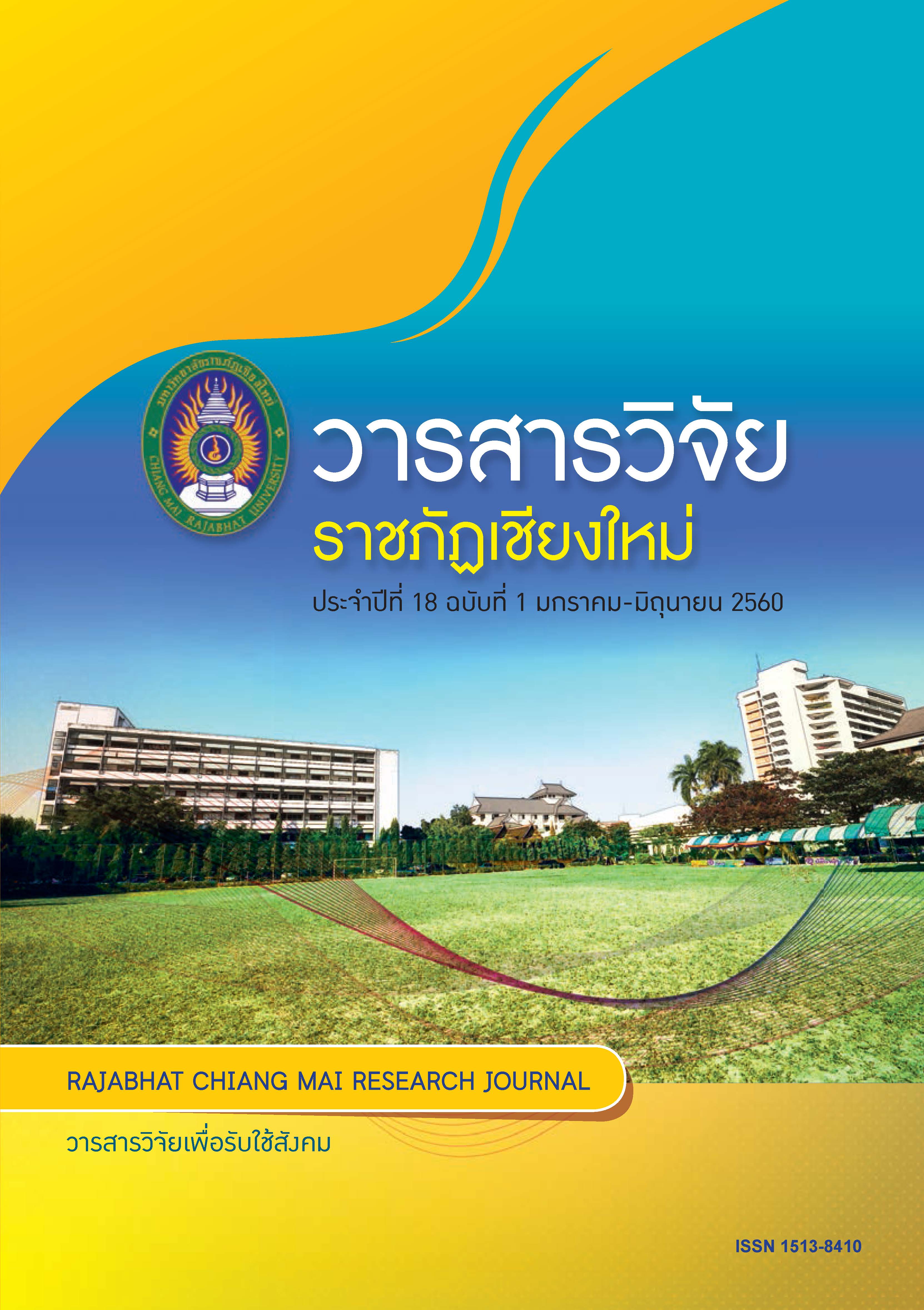Survey of social attitudes of northern community towards the burning of solid wastes in the residential area
DOI:
https://doi.org/10.14456/rcmrj.2017.213840Keywords:
social attitudes, northern community, solid wastes, residential areaAbstract
The study of social attitudes of northern communities in Thailand towards solid wastes burning in the residential area aims at 3 objectives; including 1) to study social attitudes levels of northern communities towards solid waste burning in the residential area 2) to study of factors relating to social attitudes of northern communities towards solid waste burning in the residential area and 3) to study difference between social attitudes of middle-aged and senior people groups towards waste burning in the residential area. The study was a survey research that performed by studying sampling population aged over 40 of 580 people who lives in 80 villages of meuang district and suburb areas in Chiang Mai and Lamphun provinces. The data was collected by using a questionnaire. Descriptive statistics used for analyzing were percentage, mean, standard deviation, inferential statistics i.e. Chi square test, Fisher’s exact test and t-test.
The analyzed result of social attitudes of northern communities towards solid wastes burning in the residential area showed that there was a positive attitudes level. There were factors which significantly related to this social attitudes of northern communities towards solid wastes burning in the residential area (P = 0.05), i.e. location of habitation areas, providing the knowledge to get rid of solid waste, perception of community towards solid waste burning, conscious of waste burning on environmental impact, attitude of solid waste burning forbidden and behavior of solid waste burning in the present. For the groups of 40 – 60 years old and above 60, the social attitudes of northern communities towards solid wastes burning in the residential area was found to be indifferent.
Downloads
References
กรมควบคุมมลพิษ. 2560ข. สถานการณ์มลพิษประเทศไทย ปี 2559. (ระบบออนไลน์). แหล่งข้อมูล: http://www.pcd.go.th/publica/News/GetNews.cfm?task/ (3 กรกฎาคม 2560).
กัลยา วานิชย์บัญชา. 2553. หลักสถิติ. กรุงเทพฯ: สำนักพิมพ์จุฬาลงกรณ์มหาวิทยาลัย .
ดำรงศักดิ์ แก้วเพ็ง. 2555. ชุมชน. สงขลา: บริษัท นำศิลป์โฆษณา จำกัด.
ทัศนีย์ ทองสว่าง. 2549. สังคมวิทยา. กรุงเทพฯ: โอ.เอส.พริ้นติ้.เฮ้าส์.
ทิพวรรณ ประภามณฑล และคณะ. 2552. รายงานการวิจัยเรื่อง การประเมินผลกระทบจากการสัมผัสอนุภาคฝุ่นในอากาศในภาคเหนือตอนบนของประเทศ. เชียงใหม่: สถาบันวิจัยวิทยาศาสตร์สุขภาพ มหาวิทยาลัยเชียงใหม่.
ทิพวรรณ ประภามณฑล และคณะ. 2554. รายงานการวิจัย เรื่อง การขยายผลการวิจัยมลพิษทางอากาศและผลกระทบสุขภาพสู่ชุมชนเพื่อการเรียนรู้และลดแหล่งกำเนิดฝุ่นในอากาศในชุมชนภาคเหนือตอนบนของประเทศไทย. เชียงใหม่:
ศูนย์วิจัยด้านมลภาวะและอนามัยสิ่งแวดล้อม สถาบันวิจัยวิทยาศาสตร์สุขภาพมหาวิทยาลัยเชียงใหม่.
พีรนาฏ คิดดี อานุช แก้ววงค์ และสุดสาคร พุกงาม. 2550. รายงานการวิจัยเรื่อง ความรู้ ทัศนคติและพฤติกรรมในการจัดการขยะมูลฝอยของประชาชนในอำเภอป่าพะยอม จังหวัดพัทลุง. สงขลา: คณะวิทยาศาสตร์ มหาวิทยาลัยทักษิณ.
มหาวิทยาลัยเชียงใหม่. ศูนย์วิจัยและจัดการคุณภาพอากาศ. 2554. รายงานการวิจัยเรื่อง รายงานการทบทวนวรรณกรรมการเผาขยะชุมชนในที่โล่งและการจัดการ. เชียงใหม่: ศูนย์วิจัยและจัดการคุณภาพอากาศ มหาวิทยาลัยเชียงใหม่.
มหาวิทยาลัยเชียงใหม่. สถาบันวิจัยสังคม. 2555. การบริหารจัดการระบบกำจัดขยะแบบศูนย์รวมขององค์กรปกครองส่วนท้องถิ่น. (ระบบออนไลน์).แหล่งข้อมูล: http:// www.sri.cmu.ac.th (2 ตุลาคม 2558).
วันวิสาข์ คงพิรุณ ศรัญญา ถี่ป้อม และวิโรจน์ จันทร. 2560. ปัจจัยทีมีผลต่อพฤติกรรมการจัดการ ขยะในหมู่บ้านโป่งปะ ตําบลแก่งโสภา อําเภอวังทอง จังหวัดพิษณุโลก. วารสารวิชาการสาธารณสุข. 26(2), 310-321.
สัมชญา หนูทอง. 2556. ความรู้และพฤติกรรมการจัดการขยะมูลฝอยของผู้นำท้องถิ่น : กรณีศึกษาองค์กรปกครองส่วนท้องถิ่นในเขตอำเภอสอยดาว จังหวัดจันทบุรี. ปัญหาพิเศษ รัฐประศาสนศาสตรมหาบัณฑิต บัณฑิตวิทยาลัย มหาวิทยาลัยบูรพา.
Coon, D. 1997. Essential of Psychology : Exploration and application. 7 th ed. Pacific Grove: Brooks/Cole.
Crooks, R.L. and Stein, J. 1991. Psychology: Science, Behavior, and Life. 2 th ed. Forth Worth: Holt, Reinehart & Winston.
Downloads
Published
How to Cite
Issue
Section
License
1. Articles, information, content, images, etc published in the “Community and Social Development Journal” are copyrighted by the Community and Social Development Journal, Chiang Mai Rajabhat University. In order to properly distribute the articles through print and electronic media, the authors still hold the copyright for the published articles under the Creative Commons Attribution (CC BY) license, which allows the re-distribution of the articles in other sources. References must be made to the articles in the journal. The authors are responsible for requesting permission to reproduce copyrighted content from other sources.
2. The content of the articles appearing in the journal is the direct responsibility of the article authors. The editorial board of the journal does not necessarily agree with or share any responsibility.














